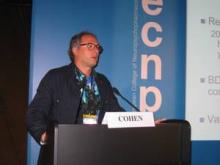PARIS – Many psychiatrists have overdiagnosed bipolar disorder in children and adolescents over the past decade, which has led to overly aggressive treatment with second-generation antipsychotic drugs, Dr. David Cohen said at a press briefing at the annual congress of the European College of Neuropsychopharmacology.
This issue might start to resolve with the scheduled publication in 2013 of the fifth edition of the Diagnostic and Statistical Manual of Mental Disorders (DSM-5), because the current draft establishes a new diagnostic category that Dr. Cohen said is more appropriate for many of these children: temper dysregulation disorder with dysphoria (TDDD).
"I’m very pleased that the DSM 5 Working Group intends to improve the way these kids will be characterized by changing the label to TDDD. I think this labeling will help to better characterize this disease and not confuse [these patients] with bipolar disorder," Dr. Cohen said in an interview. Results from follow-up studies suggest that children and adolescents with the spectrum of symptoms included in TDDD, which could also be labeled today as severe mood dysregulation, "may be risk factors for [the diagnosis of] bipolar disorder in adulthood, in perhaps 20% of patients, but many do not develop bipolar disorder," said Dr. Cohen, professor of psychiatry at the University of Paris and head of the department of child and adolescent psychiatry at La Salpêtrière Hospital in Paris.
"I have [results from] long follow-up studies that do not show that manic symptoms in children lead to bipolar disorder" when they become adults. Certain children with symptoms that often characterize bipolar disorder "may be at risk for having bipolar disorder as adults, but not at high rates. Only after a child is 11 or 12 years old and you see these symptoms can you be confident that it is likely bipolar disorder. Adolescence is when" the diagnosis of bipolar can start to be made with any confidence, he said.
"Puberty is a good threshold for talking about bipolar disorder. TDDD is a better diagnosis for pre-pubertal children" because at that stage of life the manic symptoms of bipolar disease, such as irritability, mood change, hyperactivity, and sleep disturbance, can serve as risk markers for the eventual development of bipolar disease, but not at high rates. "Only once a child is at least 11 or 12 years old can you see these symptoms and be confident that it is likely bipolar disease of adolescence or beyond." Adolescence is when the diagnosis of bipolar disease can truly start. A reliable diagnosis of bipolar disorder in a younger child "is really exceptional."
Dr. Cohen’s views are at odds with recent trends in the diagnosis of bipolar disorder among children in the United States. American psychiatrists have, over the past decade, diagnosed bipolar disorder in children as young as age 5 years, resulting in incidence rates that ballooned by as much as four-fold during the 2000s, according to insurance claims data, commented Dr. Rasin Somer Diler, medical director of the Inpatient Child and Adolescent Bipolar Services program at the University of Pittsbugh. Dr. Diler said that in his own program diagnosis rates in younger children have risen by about a third from the late 1990s through the late 2000s, but he added that this was in a referral program that might differ from what has occurred in U.S. community hospitals and office practices.*
This shift in practice has also led to inordinate prescribing of second-generation antipsychotics to children, Dr. Cohen said. "These drugs are only appropriate for bipolar disorder episodes in adolescents."
Psychiatrists "usually use adult criteria to diagnose bipolar disorder" in children and adolescents. "Manic symptoms can be quite frequent in children, but I don’t label them as having bipolar disorder. With manic episodes and bipolar disorder in children you need to see how the symptoms appear over time. You cannot do a proper differential diagnosis in a few days."
Another issue when diagnosing bipolar disorder in adolescents is the differential diagnosis, distinguishing bipolar disorder from schizophrenia or attention-deficit/hyperactivity disorder (ADHD), conditions that also can present with manic symptoms. "ADHD is much more prevalent in children than bipolar disorder. If you see a child with irritability, it is much more likely to be ADHD." Schizophrenia also poses a diagnostic challenge. "Sometimes, it is only by follow-up of adolescents that makes us confident that the diagnosis is bipolar disorder, compared with schizophrenia."
Adolescents who are accurately diagnosed with bipolar disease will likely require long-term treatment. Dr. Cohen reported his experience with about 60 patients first diagnosed with bipolar disease as adolescents he followed for an average of 8 years. From this group, only five patients did not experience relapses. "When you continue treatment, relapses are fewer and the symptoms remain under better control." But he acknowledged that his experience likely involves a referral bias because his service generally only sees the most severely affected adolescents. He said that he would consider attempting treatment withdrawal from an adolescent patient who has remained mood stabilized on treatment for about 5 years, but he avoids trying treatment withdrawal at times of life with elevated emotional stress, such as when schooling ends or when patients face issues in their sexual relationships.


